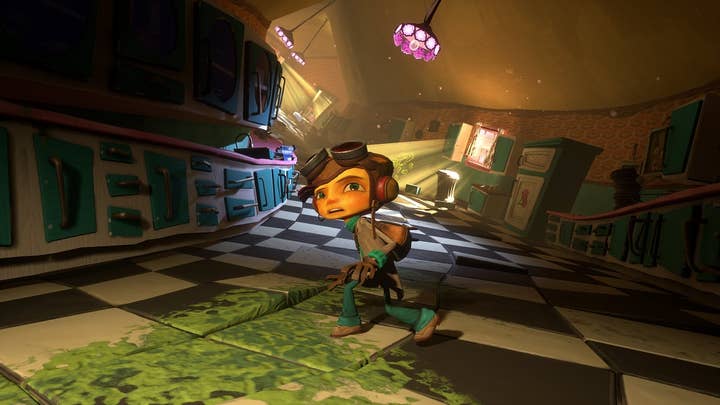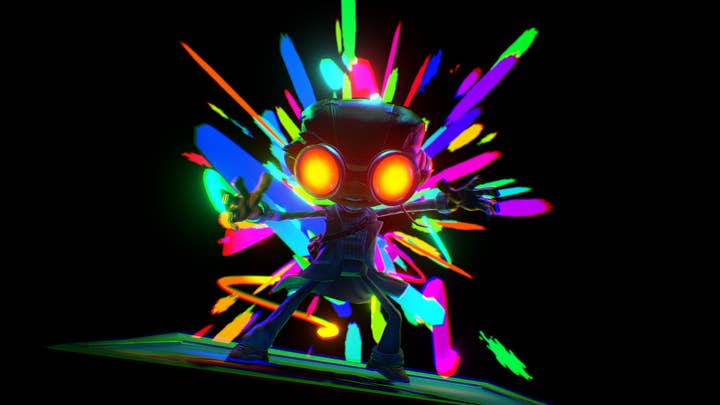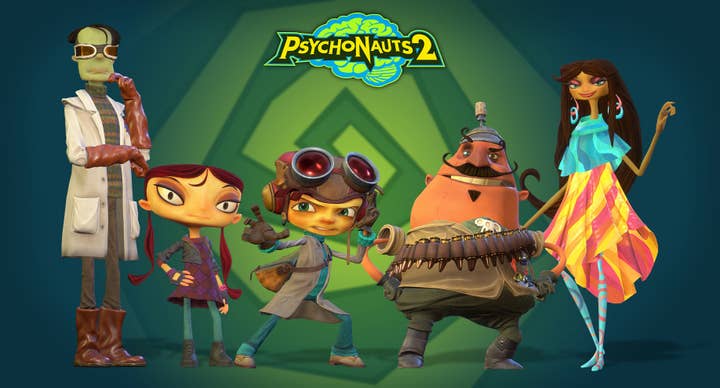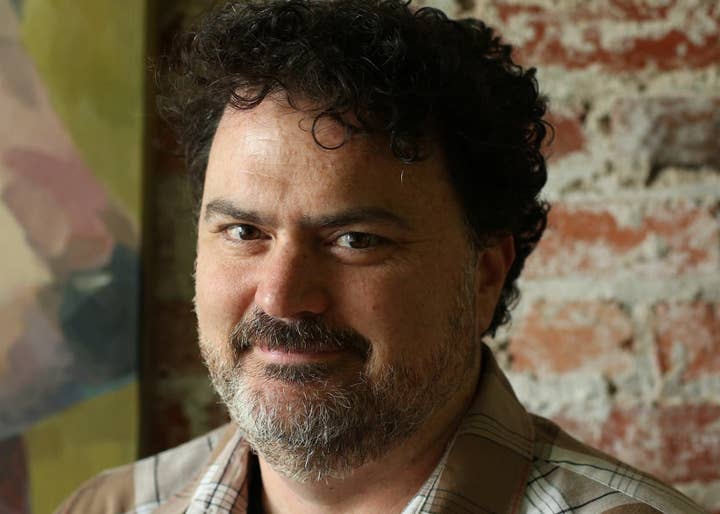Inside the mind of Tim Schafer
Double Fine founder talks about the impact of subscription models and how he'll ultimately judge the Microsoft acquisition
Psychonauts 2 is set for release on Wednesday, which means that Double Fine Productions' very first game will be receiving its first full sequel some 16 years after the original launched.
The two games serve as bookends for Double Fine's first phase of existence as an independent developer. One was in the works after the studio's founding in 2000, while the other was deep in development when Microsoft acquired Double Fine in 2019.
Speaking with GamesIndustry.biz, Double Fine founder Tim Schafer reflects on what he's proud of from his time running an independent studio.
"Focusing on the team is in some ways the final product of the company, and the games are a by-product of that"
"Some of the things I'm glad we did along the way were investing and committing to the team," Schafer says. "We had a lot of the same people on the first [Psychonauts] on the second game because there's this mutual loyalty and trust on our team. I think we've always maintained that and been very transparent through all the ups and downs over the years. So I feel like really focusing on the team is in some ways the final product of the company, and the games are a by-product of that team relationship being healthy and going well."
Schafer is quick to note that's not exactly a sure-fire formula for success, and things could have turned out very differently if it didn't catch a few breaks along the way.
"We've been very fortunate," Schafer says. "I think there are a lot of realities where things didn't work out so well for us. But I think we've made some choices that worked out well. We've committed to focusing on what our strengths are, which are doing the most creative and original work we can.
"I think that's often seemed like a risky move -- doing something creative and original -- but in the end I think it's what's safest for us because it's an area we can really stand out. It takes a lot of commitment to do something really original given all the financial pressures on a studio, but it was more of a long-term goal. Like, 'If we stick to making creative, unique titles we feel passionate about, eventually it will become clear our titles are worth playing.'"

That's part of why Schafer feels Double Fine is a good match for Microsoft today. Even though the Xbox maker dropped the original Psychonauts project in 2004, Schafer says the types of games the company specializes in make more sense under the modern Microsoft's business model.
"The way things are going is not something I feel like I have control over. You look at what happened with streaming in other media and it's just unstoppable"
"I think the value proposition now is what we can contribute to the Game Pass subscription service," Schafer says. "I think everything is moving in some form or another to subscriptions. That's just a relationship with players which I think is really great for Double Fine, where we want to do something new and original and surprising, which means there might be a higher barrier of entry for players who don't know what this is. And by lowering that barrier financially where it's not a matter of buying one $70 game over another and it's more about the time it takes to download them because they're all up there on Game Pass, I think that's a huge way for Double Fine games to find their audiences faster."
Schafer acknowledges that some people have concerns how subscription services erode ownership or how they might build up barriers to entry for developers and turn services into yet another gatekeeper determining which developers get access to an audience, but he sounds convinced subscriptions are taking over.
"I don't really feel like there's much of a choice about these things," Schafer says. "The way things are going is not something I feel like I have control over. You look at what happened with streaming in other media and it's just unstoppable. Even as a consumer, I went through a move recently and had all these boxes of DVDs and CDs and was like, 'Why do I own all these things?' So even as a consumer, I'm part of that move to subscription services. It just fits more of what I want."
As for Double Fine's acquisition by Microsoft and the ensuing support for Game Pass, Schafer thinks that's more about "being clever about being in a positive place when that subscription thing takes over." And for whatever drawbacks subscription services may have in the future, he notes they have some concrete benefits as well.
"Netflix definitely has its own ecosystem, but it's funding a lot of original content," he adds. "A lot of those services are funding and creating shows, and really high-quality shows are coming into existence that wouldn't have existed under, say, network television models. For us, being part of Xbox and Game Pass was being on the positive side of that. Let's be where original new great content is being funded and created, so that was our navigation choice.
"I still think there will be places like Itch.io or other platforms for people who want to have a direct relationship and release things independently. Kinda like the Bandcamp of video games, right?"

Clearly Double Fine fits nicely into Microsoft's current strategy, but the joining of the companies two years ago still came as a surprise to many an industry-watcher. Microsoft's track record of partnerships with beloved developers has a few blemishes on it (Ensemble and Lionhead were shut down, Bungie eventually went independent), and Double Fine never seemed like an indie eager to go corporate.
"We always made choices based on having something of value in case we wanted to sell, but we never had an exit strategy, per se"
"Acquisition was not something in our plans," Schafer explains. "I always wanted to be open to it. We've always maintained all of our intellectual properties at Double Fine, and we invested in our own tech for the first many years of our development. We always made choices based on having something of value in case we wanted to sell, but we never had an exit strategy, per se."
It was only when Double Fine started looking for investment for Psychonauts 2 that the possibility of an acquisition was seriously broached.
"There's been a lot of investment money going around in games the last five years," Schafer says. "There's been a lot of talk of investment from overseas, and we were getting interested in what we could do if we had some kind of funds, what we could do for the game and how we could invest in and grow the studio. That just led to us talking to everybody, and we talked to Microsoft. But they don't really make those kind of small bets; they only make really big commitments to whole studios.
"So [an acquisition] wasn't on the plan, but when we heard about their philosophy starting with the acquisition of Mojang -- how they've had success by acquiring but not absorbing companies, not interfering with them and letting them be creatively who they are -- that's really worked out and been successful for them, and that seemed really appealing to us."
Schafer says the Mojang deal really felt to him like the moment where Microsoft hit upon a good model for working with an acquired company without smothering it.
"Microsoft has lived up to their word as far as what they said before the acquisition"
"We've been given so much creative freedom now," Schafer says. "Nobody has probed Psychonauts to second guess our decisions or anything like that. We've been trusted to handle the creative side completely, but we can opt-in to all these resources, like having it tested for accessibility and mental health checks. We had the resources but were left creatively to our own devices. And that's been great, and Microsoft has lived up to their word as far as what they said before the acquisition."
As for what's changed since the deal, Schafer says he doesn't have to spend so much time worrying about refining pitches, something that took up an increasing amount of his time after 2009's Brütal Legend, when the company switched from one big game at a time to juggling multiple titles.
"I would constantly be thinking about how I was going to make payroll in a few months," Schafer says of that era, "and now I don't have to think about that at all, so that's a huge load [off]. That's been replaced with regular meetings with other studio heads at Microsoft to check in, but the tax on my mind for those meetings is a lot less than the tax of going out and shaking the trees for money all the time."

The studio's output of internally developed games has slowed as Psychonauts 2 approached completion, but Schafer says the studio doesn't intend to go back to being a single-project studio.
"There was a period at the end of Psychonauts 2 where we had all hands on deck to finish the game, but we're definitely going back to multiple projects afterward," Schafer says. "Until it happens again? Who knows? We don't have any rules about that but we're set up to have multiple projects and we have enough ideas to do that."
While the Microsoft acquisition appears to be working out to his liking so far, Schafer has a couple of metrics he'll use to ultimately determine whether or not the deal was a good one.
"The two things for me are the quality of the games we put out and the happiness of the team," Schafer says. "If in five years we're making really great creative games and we still have a lot of our team hanging out and happy to be working at Double Fine, that's my main metric. And so far, I think we're shipping a really good game and the team's really happy and proud of it."
As for what those great creative games of the future might look like, Schafer isn't sure. Double Fine prides itself on originality, but Schafer himself has spent much of the last decade working on titles with a clearly nostalgic bent to them. Psychonauts 2 is a sequel to a 16-year-old game. Before that, the Kickstarted Broken Age was a metaphorical return to the type of adventure games he made at LucasArts before starting Double Fine. The remasters of Grim Fandango and Day of the Tentacle were literal ones.
"All of this has been in some ways looking back on comfortable things," Schafer acknowledges. "And it's been rewarding. I really enjoyed doing those remasters, I loved making an adventure game, and I loved making Psychonauts 2. But I think the team and I are really excited about doing something completely new that will be completely surprising to people."









